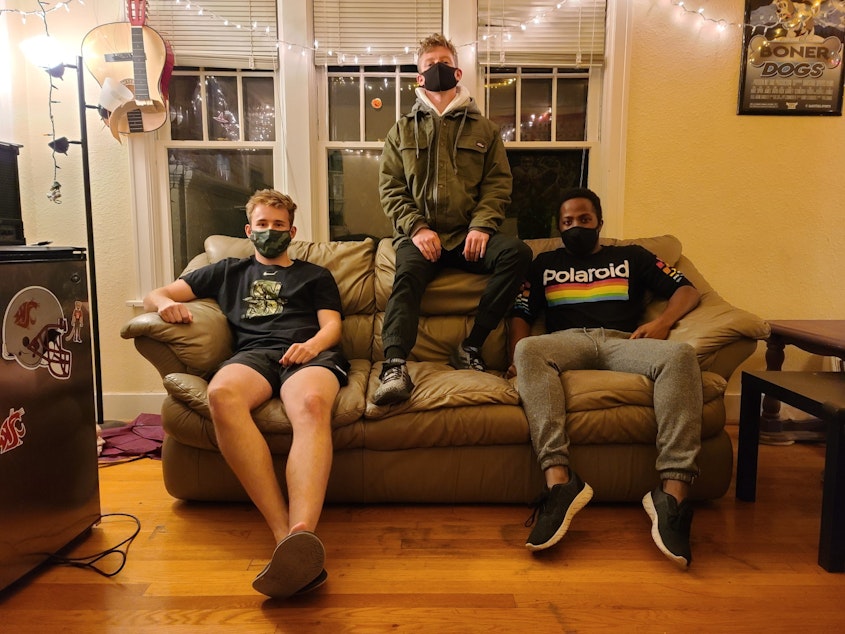'Pretty certain there was going to be an outbreak.' 2 college students on navigating the pandemic

It's finals week at Washington State University, a symbolic end to a difficult semester for many students.
WSU roommates Dan and Campbell talked about navigating the pandemic in a social environment like college.
The city of Pullman, the home of WSU, was listed as number one on the New York Times’ top Covid-19 hotspots in early September.
Dan and Campbell are seniors and roommates at WSU. Dan got sick with Covid-19 during the spike. He believes he caught it when school started in September, as everybody was arriving back in Pullman.
DAN: I don't think anyone was taking it that seriously at that point.
You put 20,000 to 30,000 college kids in this much space, I think everybody was pretty certain there was going to be an outbreak.
I don't know if anyone could have guessed that it would have been this bad.
Sponsored
CAMPBELL: I just know that, like, friends would have friends over and there'd be maybe 10 to 15 people at their place. And then everybody would get drunk and they'd invite more people.
Maybe the host didn't even know that they were being invited. But then all of a sudden, you've got 20 or 30 people. I'll walk through Greek row and I'll see 25 people just on their front porch.
DAN: I think it's the thing with college kids feeling they're invincible. Covid may not kill you and you may not even get sick. But you've got to worry about the other people around you.
I tested positive on September 10. There were two separate ways I could have gotten it.
I was with a few friends the day before, and we went down to the river. Two of those friends had gotten tested the day before, but they hadn't bothered to quarantine or tell anybody that they had been tested. Those tests later came back positive, so I could have gotten it there.
Sponsored
And then also, my girlfriend's roommate told us, that same day she said, "Yeah. So I haven't been able to taste or smell for the past week. Um, I might have Covid but it's no big deal. I don't have any symptoms."
I was a little more worried about my girlfriend since she has asthma. So I could have gotten it either of those two ways.
My friends from the river didn't tell me, somebody else actually told me like two weeks later. I saw her and I was like, "Did you give me Covid?"
And she was like, "I might have given you Covid."
And I was like, "Okay."
Sponsored
I wasn't as pissed at my friends from the river. But I was more pissed at somebody who knew they were symptomatic and decided not to tell anybody.
I told my girlfriend, "You need to talk to your roomate — you need to tell her that was not cool."
Beause her roommate [was saying] ,"I don't have symptoms, it's not a big deal," well, that doesn't mean you're not going to give symptoms to someone else.
You don't know other people's underlying conditions. And [my girlfriend's] symptoms were a lot more severe than mine.
CAMPBELL: So he tested positive and I was like, "Crap, I probably have it."
Sponsored
I tested negative. But then after we knew that Dan had it, we all just kind of stayed in our rooms for like the rest of the week. And then if we came downstairs to make food or something we always had our mask on.
DAN: Yeah, my confidence in masks has definitely gone up after keeping my roommates safe from the virus.
I think Campbell gave me the idea to wear my mask in the house cause I like came up one time and he was wearing his, and I probably ducked back downstairs to get mine.
Yeah, I can't remember a time that we were up here for maybe like more than 15 seconds at a time. And then he just made his food and went downstairs and I cooked whatever I was cooking and I went back up to my room.
The first day or two, psychologically, I was like, "I’m infected." After that I remember waking up one morning and looking in the mirror and I was like, "I feel great today but I am contagious with a deadly virus."
Sponsored
By that tenth day I was like, "Alright, well, I get to go upstairs now."
Being immune — airquotes immune — there are no real legitimate studies of how long [immunity] lasts.
I think the start to the the spring semester is going to have some sort of spike. There are going to be students coming back to Pullman who maybe stayed at home during fall semester, who are going to go back spring semester.
That combined with kids coming back from when they went home for winter break, [who] just want to party again ... I think there will be a spike.
This story was produced by Natalie Newcomb, or KUOW's Radioactive Youth Media program and edited by Joshua McNichols. It's part of KUOW's series Voices of the Pandemic.
We reached out to WSU to learn what they're doing to prevent the next spike of Covid-19 on campus when students return to school in mid-January. They're testing all students regularly, canceling spring break to discourage travel. They have medical staff testing wastewater from student housing several times a week for signs of the virus. They're also counseling students who've had the virus that they can catch it again.




